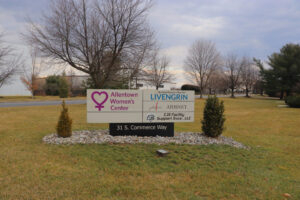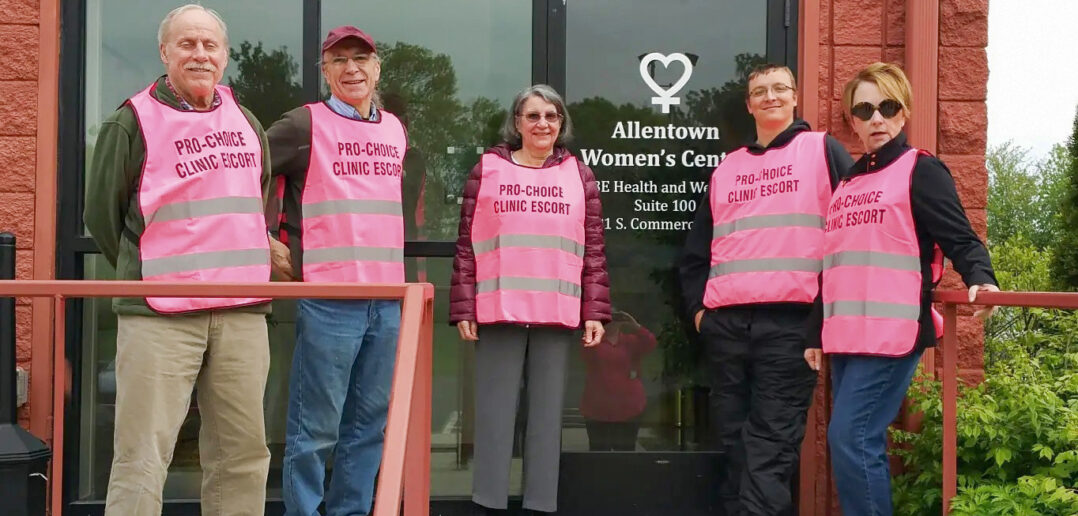Upon walking into the Allentown Women’s Center, a patient is greeted by a locked wooden door equipped with a telecom system. She must buzz the doorbell and state her name and verify her appointment before the door is unlocked.
After stepping inside the clinic, the woman must go straight to the receptionist to have her ID photocopied, ensuring there is a record of everyone who enters the clinic. “Seinfeld” plays on the waiting room TV to help the patient de-stress as she waits for a nurse to retrieve her.
These security measures are standard in abortion clinics all over the country, as these locations have become targets for violence and anti-choice protesters.
“No one who’s not supposed to be here is going to be here,” said Ash Turner, social media and outreach manager for the center.
The center has a long history of adapting to changes in public opinion and laws.
Most recently, the 2022 Supreme Court decision regarding Dobbs v. Jackson Women’s Health Organization overturned Roe v. Wade, uprooting federal protection for abortion and making abortion a state’s rights issue. It has put even greater pressure on organizations looking to protect women’s reproductive rights.
“It shattered the sense of hope that we carry,” Turner said.
Women seeking abortions in the Lehigh Valley deal with a variety of issues and choices. Turner said many of them are already parents and cannot afford to have another child, while some others have experienced difficult pregnancies in the past.
“No reason for seeking an abortion is the wrong reason,” Turner said.
Since the center first opened its doors in 1978, it has experienced periodic closures due to zoning laws, which placed high fines on abortion clinics.
The center relocated from downtown Allentown to Bethlehem due to excessive and aggressive protest activity. Turner recalled how clinic escorts would hold up tarps to create tunnels for patients to walk from their cars to the clinic.
The center is open today as the only independent abortion clinic in Northeastern Pennsylvania.
In its new location, the center doesn’t experience protest activity or violence to the same degree. However, anti-abortion advocates still make their voices heard.
John Roizin, co-owner of the center, said protesters still come and pray with rosaries outside of the clinic. They consider themselves “sidewalk counselors” and aim to talk women out of seeking an abortion.
Protesters even go as far as to show up at Roizin’s house to protest his work at the clinic.
“There is the impact of intimidation by protesters and stigmatization by still some in our society,” Roizin said. “It is a very difficult, personal decision for a woman to make.”
Turner said the center is also accustomed to receiving “anti-mail.”
“It’s just a bunch of love letters from people who hate us,” Turner said. “They’ve sent books about how people are damned to hell for assisting in providing abortion or letters about how we should change career paths.”
Turner said the amount of anti-mail has increased since the Dobbs v. Jackson Women’s Health Organization decision was handed down.
Many things changed for the center after the decision.
Turner said on the day of the decision, their phones were ringing off the hook. Some people were calling to offer volunteer hours and support, others called in a panic trying to understand if they could still get an abortion in Pennsylvania.
They also started receiving phone calls and appointments from people living outside of Pennsylvania.
“We are now seeing patients from Ohio, Maryland, Delaware, as well as a few from Kentucky, Georgia, Florida and Texas,” Roizin said. “This has caused longer days for the staff and longer waiting periods for patients. We have had to change our protocols so that we comply with their home states laws.”
Support – and Scrutiny
Many groups collect funds to help women pay for abortion services and travel. The National Abortion Federation and the Abortion Liberation Fund of Pennsylvania are some of the organizations the center works with to ease the financial burden of abortion services.
In Pennsylvania, state insurance cannot be used for abortions, which means patients on Medicaid cannot use their insurance to cover the cost. Turner said the center has a designated fund to help cover abortion costs and has seen an increase in donations since the Dobbs decision.
Pennsylvania has other laws and regulations that make getting an abortion more difficult. Women must have an initial appointment and consultation appointment and then wait at least 24 hours before having a secondary appointment.
Clinics like Allentown Women’s Center also face state restrictions. Targeted Regulation of Abortion Providers (TRAP) laws can be time- and cost-consuming for clinics. The number of abortion clinics in Pennsylvania has dropped from 81 in 1992 to 18 in 2022.
“No other field of medicine is as scrutinized,” Roizin said. “Keep in mind that abortions are a very safe procedure.”

Multi-tenant sign displays The Allentown Women’s Center as part of the complex located at 31 S. Commerce Way in Bethlehem, Pennsylvania. (Julia Contino/B&W Staff)
The state limitation for abortion in Pennsylvania is 24 weeks into pregnancy. The center provides abortions up to 21 weeks and six days. Anything beyond that period is done in a hospital setting as opposed to a clinic.
There is a Planned Parenthood located in Allentown that also provides abortion services. However, Turner said Planned Parenthood Allentown does not provide abortions to women who are beyond 13 weeks pregnant.
Planned Parenthood Allentown is operated by Planned Parenthood Keystone, which declined a request for an interview.
Turner said Lehigh Valley Health Network and St. Luke’s often refer women to clinics like theirs or Planned Parenthood before offering abortion services.
“We tend to hear stories from patients about (Lehigh Valley Health Network) basically throwing their hands up when they’re asked about abortions and refusing to provide abortion services unless they’ve already tried to receive them at a clinic,” Turner said.
Jamie Stober, media relations specialist for the network, said their goal is to provide patients with the highest attainable level of quality care that is consistent with the patient’s wishes and conforms to the law.
“Lehigh Valley Health Network respects the social, religious and ethical values of every patient,” Stover said. “It recognizes and will uphold the right of each patient to make individual health care decisions in conformity with applicable laws.”
A New Level of Activism
The overturning of Roe v. Wade sparked a new level of activism in the Lehigh Valley.
Natascha Grief said she couldn’t find a local rally to attend after the decision. She decided to create Bans Off Lehigh Valley to host rallies and conversations for people fighting for the right to choose.
“Within like 48 hours, we had a rally happening in downtown Easton,” Grief said. “It became a candlelight vigil at the end, and it was a very powerful thing. It just became clear what was at stake.”
Even though the overturning of Roe v. Wade did not change the laws in Pennsylvania, pro-choice supporters were concerned about what the midterm elections would bring.
Grief said Bans Off Lehigh Valley’s primary goal was to motivate people to go out and vote for pro-choice candidates.
“We can’t let this slip out of the news cycle,” Grief said. “We have to keep it in people’s face. We have to keep people talking about it.”
They hosted more rallies, postcard writing parties and discussion groups to encourage more people to be active.
Former Gov. Tom Wolf was instrumental in stopping anti-abortion legislation from being signed into law in Pennsylvania. State law allows only two consecutive terms and, in 2022, the governor seat was open.
“Thankfully, the outcome of the election has allowed Pennsylvania to continue to respect a woman’s choice over her own body,” Roizin said. “If Josh Shapiro had not won the governorship, I think that we would have most likely had to close our doors within a month.”
With major Democratic victories across the ticket in Pennsylvania, anti-abortion legislation is unlikely for the next four years. But that doesn’t mean the fight is over.
“It feels like winning a battle,” Grief said. “But you know, you just go on to the next one.”
Local municipalities have been trying to find their place in the abortion battle.
Allentown City Council has proposed but delayed voting on several ordinances to protect women’s right to abortion. Among other things, the ordinances would establish a buffer zone around abortion clinics and place restrictions on advertising from anti-abortion pregnancy crisis centers.
“There’s definitely a few people that I know of on Allentown City Council who are fighting hard for it,” Turner said. “But most people don’t pay attention to small government in their area, which is sad because that can sometimes be the most important part to pay attention to.”
When Turner attended City Council debates about the ordinances, she said it was obvious there are many community members who are against it.
Grief said she looks to a time when laws are not needed.
“Laws can’t tell you what to do when it comes to the right that you have to your own personhood, your own body,” Grief said.






Comment policy
Comments posted to The Brown and White website are reviewed by a moderator before being approved. Incendiary speech or harassing language, including comments targeted at individuals, may be deemed unacceptable and not published. Spam and other soliciting will also be declined.
The Brown and White also reserves the right to not publish entirely anonymous comments.
5 Comments
Very sick people. Disgusting baby killers
This article is extremely one-sided and villanizes the pro-life side. If we want to support communication we need to include both sides respectfully in a discussion.
I don’t see how it villanizes the pro life side. But you can be certain that the overwhelming majority of anti abortion activists villainize women, staff and volunteers at the clinic.
Another great piece Maeve. Keep up the work!
We’re not about the antis and their vulgarity, their violence, their vengeance. We’re about women’s resilience and hope, their self-determination to choose what they want and need for their lives.